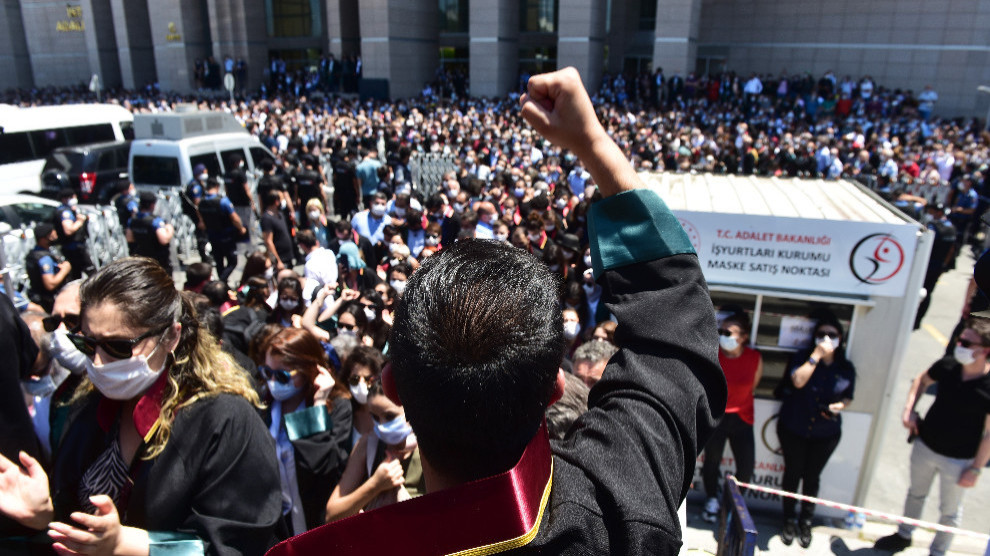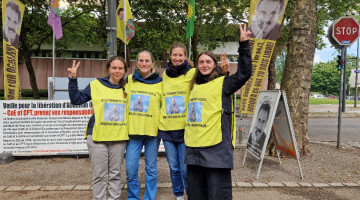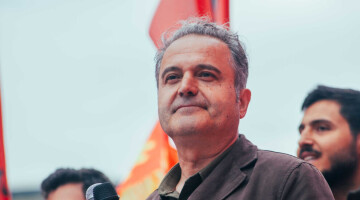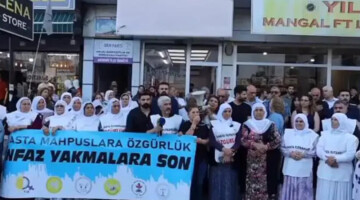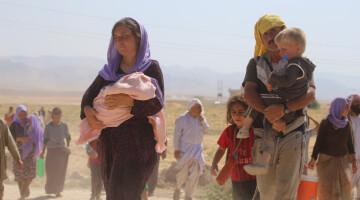The Istanbul Bar Association has protested in front of the Çağlayan Courthouse against the draft law to change the law and the electoral system of the bar associations presented by the governing coalition MHP/CHP. Thousands of lawyers made it clear under a large police contingent: "The defence cannot be silenced."
The draft law would allow alternative associations to become members of the umbrella organisation of the Turkish Bar Associations organised at provincial level. This would weaken the voting power of the largest chambers such as those in Istanbul, Izmir and Ankara, which are among the most uncomfortable critics of Erdoğan. The bar associations would thus go under state control.
"We are lawyers, we do not obey"
Numerous representatives of political parties, trade unions and democratic mass organizations also took part in the rally in front of Çağlayan. The Istanbul Chamber President Mehmet Durakoğlu described the rally in a speech as joint resistance against Ankara. Eighty lawyers' chambers from Turkey had called on the governing parties to withdraw the controversial draft law, Durakoğlu said, pointing out the problems of defence lawyers: "We are denied access to files, we are not allowed to see them. In this country, lawyers have to justify themselves when they take on a mandate and defend certain people. Lawyers are on hunger strike because they demand a fair trial. Ankara must know that the bar associations will not remain silent. We are lawyers, we do not obey. We do not surrender to the climate of fear. We will always believe in democracy."
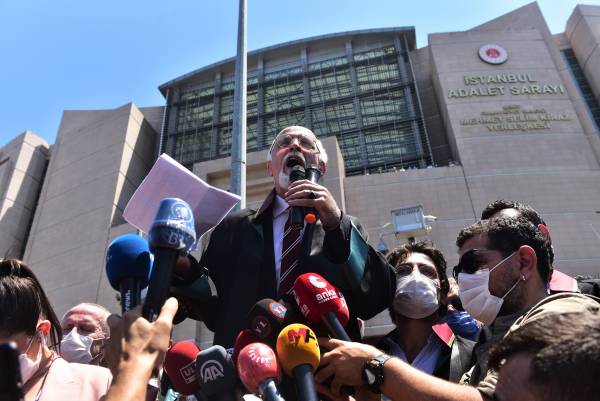
Central rally in Ankara announced
In Ankara, a central massive rally of the bar associations will take place on 3 July. The bill was triggered by a statement by the Ankara Bar Association in which harsh criticism of the homophobic statements of the chairman of the state religion authority Diyanet was expressed. In a Friday sermon at the beginning of Ramadan, the month of fasting, at the end of April, the cleric Ali Erbaş branded adultery and homosexuality as causes of illness and as un-Islamic. As an example he referred to the spread of HIV/Aids and also attributed the outbreak of the coronavirus to homosexuality and the living together of unmarried couples.
Erdoğan announced plans after criticism against homophobic cleric
Turkish President Recep Tayyip Erdoğan had announced the imminent change in the law after the Ankara Bar Association criticised homophobic statements by the chairman of the state religion authority Diyanet, Ali Erbaş. In a Friday sermon at the beginning of Ramadan, the month of fasting, at the end of April, the cleric branded adultery and homosexuality as causes of illness and as un-Islamic. As an example he referred to the spread of HIV/AIDS and also attributed the outbreak of the coronavirus to homosexuality and the living together of unmarried couples.
The Ankara Bar Association accused Erbaş, who had in the past protected misogynists and ignored child abuse, of degrading people and making them the target of attacks. "It should not surprise anyone if Ali Erbaş in his next speech would call on the people to burn women as witches in public places", the statement also said. The association pointed out that Erdoğan stood behind his homophobic Diyanet boss and rated the criticism of the lawyers' association as "anti-state". He then instructed his party to draft a law to bring the bar associations into line. An investigation was also opened against the chamber in Ankara for "vilification of religious values".
"Freedom for the defence"
In early June, 79 bar associations issued a joint statement calling on the government to withdraw the controversial draft law and at least keep its doors open for dialogue and negotiations on the planned changes, saying that otherwise there would be protests. Since Erdoğan showed no reaction, the chambers announced a march to Ankara under the motto "Freedom for the defence". Since Friday, lawyers and the chairmen of 41 lawyers' associations, including the three largest Izmir, Istanbul and Ankara, as well as Amed (Diyarbakir), Van and Mardin have been marching towards the Turkish capital. Every day, ten kilometres were symbolically covered on foot, the rest of the distance by car. The action met with broad approval nationwide, and in many cities the lawyers were received by large crowds of people. The protest march was repeatedly stopped and attacked by the police.

